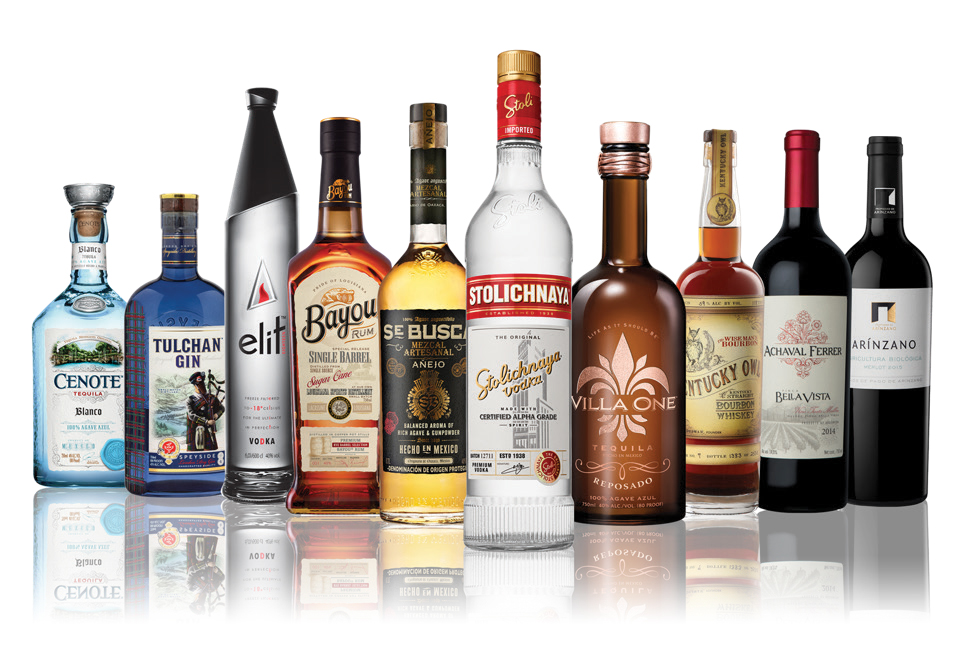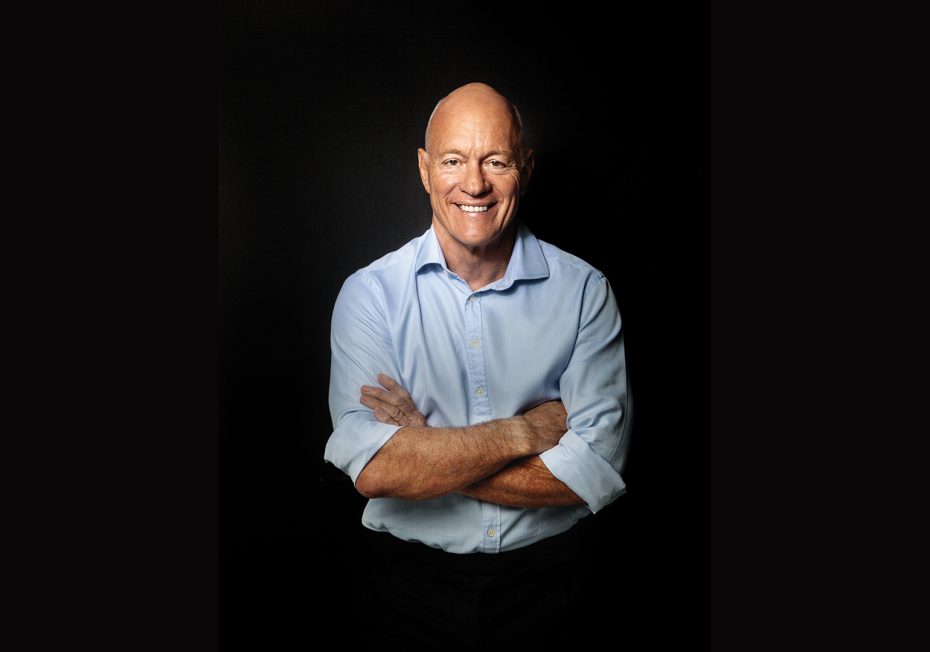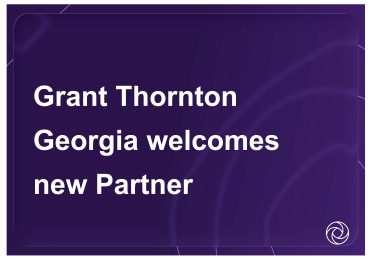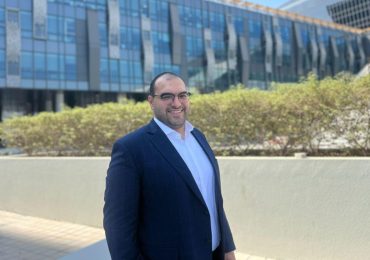Global CEO of Stoli Group, Damian Mckinney, was born in Kenya. He was a 35-year-old lieutenant colonel of the Royal Marine Force when he realized that, at some point, he would eventually have to quit the army. It was then that he decided he did not want to be a military general, instead, he wanted to be a leader on the business front.
Damian, great to host you in Georgia.
It is great to be here.
Thank you so much for being with us. Tell us about the reason for your visit. I am not sure if this is your first time in Tbilisi or not?
It is my first time. I have to say, I am a lover of history. There is a little kid inside me that has always wanted to come to Georgia. It is a 24-hour visit, but in just a very short time, I have loved being here. I love the people. I love the country. I love the fighting spirit; I believe that’s a good description of Georgia. Tell me about your story. Before mentioning Stoli Group, there are other things we need to talk about. You are in favor of publicity and, in the twenty-first century, that is an advantage.
Tell me more. How do you feel about the current business environment? What is business today in the twenty-first century?
What is business today? I think that is a great question. Let me just take a step back, if I may, you asked me about myself. I was born and brought up in Africa, in Kenya. I grew up on a farm outside Nairobi. I grew up with a culture of transparency, a love of the bush, a love of life, and a love of the world. I suppose I also grew up with a love of adventure and the truth as well as a sense of exploration. So unsurprisingly, I decided to join the military. I did not want to become what I call a conventional type of soldier. Therefore, I joined the Royal Marine Commandos.
Does that mean studying and learning military tactics?
It is a mixture of things. Fundamentally, it is commando training and then learning all the tactics. The real point is that I joined as an officer, only thirty-five of us in our year in the UK, but I trained with the people I would lead. I think that is important because it means you are learning things shoulder to shoulder, but you must earn the right to be a leader and that is doing everything – whether it is physical, mental, or otherwise – better and faster. But when it comes to, let’s say for instance, remarkably simple things like food and eating, you are taught to eat last. You make sure you look after your people, and you make sure they are fed. Why is that relevant? Well, I spent fourteen out of eighteen years on active service. That is to say actually on the front line or involved in the front line in some way on operations, this gave me a real sense of being able to build great plans, but at the end of the day it’s about the execution of those plans, and fundamentally it is about visible leadership on the front line. It does not necessarily mean telling people what to do because authority alone does not work. I learned a long time ago hierarchy is about responsibility. It is not about authority, it is about doing the right thing and making the right decisions at the right time.
Did I correctly understand that during that period you covered both military planning and execution?
Absolutely. Actually, it is funny because having been involved in business studies and business university-type courses, there is a danger you spend a lot of your time on just case studies. The beauty of the military was experiential, so you would be taught something but then have to experience it and learn from doing it. I think that is a big part of learning.
Do you remember when you changed your mind? I mean deciding to quit the military and going into business. Why did you change your mind?
I sat in a bar in Norfolk, Virginia and it was there that I decided I did not want to be a general. Maybe I had read too many Richard Branson entrepreneurial-type books. I had had a fantastic career in the military. I was a young 35-year-old lieutenant colonel. In theory, with my whole life ahead of me, I sat with a blank piece of paper, and I essentially said I have twenty more years of fun. How much of that is in the military? I worked out I had four more years of fun and then I would become a general ending up in some headquarters. There is something about business and being an entrepreneur that is similar to the excitement of being on operations. I loved being on operations, so I resigned from the military the next day. I said I am going to go into business. I spent a year as a consultant and then I got a real job.
And what was that?
At the time, I joined a consultancy and I had come in with a very mission-orientated mindset, “let’s take the world on.” I have to say after the first six months I hated it, I absolutely hated it. I was in an established consultancy involved in various projects and I met a director of corporate banking at Barclays; he turned to me and said: “Damien, you look frustrated. You look very unhappy, yet I know you are enthusiastic. What is the issue?” I replied: “Do you know what? I came into business believing that it was all about big, bold dreams, taking the world on, great opportunities, and a lot of excitement. But do you know what I am facing? Risk aversion and incrementalism. At no time is there a sense of pushing for more than we can achieve.” He looked at me in the eyes and asked if I included him in that statement. I nodded and explained: “You have been negotiating a seven percent target, but you are doing seven and a half percent and you are all doing high fives. At what point do you stop and say, how much more could we do? He said: “Okay. if you think we can do better, I will give you six months to achieve 18%.” We did 32%. By building a plan where you think much bigger, you end up executing bigger. We achieved a much better result than we had set out to, and because of that, he said to me that I should set up my own company. So, I did. I set up a consultancy with a friend and we built it up into a global business over twenty years. I sold it three and a half years ago to an American company listed on the stock exchange.
We are getting closer to discussing the period when your relationship with Stoli Group started…
I first started the company in 1999, in May 1999.
Do you mean the consultancy?
Yes, it was called McKinsey Rogers. Two weeks later, I got a phone call from the new CEO, who introduced himself and asked if I would like to get involved with several of their brands. They were creating these global boards and he asked me to get involved with Johnnie Walker. Johnnie Walker at the time was a tired, aristocratic old brand that was declining; simply put, only boring old men drank it. That was my first step into the industry and getting involved in turnarounds. I did that, and I spent over eighteen years on and off working with Diageo and then working with beer distributors as well as other distributors. I was also involved in turning around Smirnoff, so we always looked at Stoli as a competitor. But the interesting thing is, and this has borne true through the years, Stoli is an amazing brand. At the time, we thought that the day it got organized, then we would have to worry, but we did not believe it would get its act together. That was the view of most people right up until a few years ago. In March 2020, I was approached and asked to give some advice, but because of my relationship with Diageo, I held off. Then in August 2020, I was asked by Yuri Schefler, the founder, through Sabina, his chief of staff, whether I would have a one-hour conversation with him and give him some thoughts. To be honest, I thought to myself that this is going to be a no-holds-barred conversation where I am going to tell him exactly what I think. I am going to tell him that the real issue here is that he has a ‘Sleeping Beauty’, though the company has been in decline for some time, it does have a portfolio of ultra-premium brands and needs real brand building. I was going to tell him that he has an organization that in many respects needs different capabilities. I am not a great fan of football, but my view was if you want to be the best in the world, you better make sure the players on the field are the best in the world. Halfway into our one-hour conversation, he asked if I would be interested in becoming global CEO. I looked him in the eye and thought I have one more Special Forces mission in me, it felt like a big transformation. I have been involved in transformations before, so I just imagined if we got this right what we could achieve. Of course, my answer was yes.
Damien, in your various interviews, you mentioned that you did due diligence about Mr. Schefler before meeting with him. Is that a habit from the military?
Yes it is. Intelligence is about forward-looking information and an understanding of what may happen. It is about understanding points of difference and understanding when something might happen in the future. Secondly, when I joined the military it was because of service. There was an adventure aspect to it, but I believed in service. I spent eighteen years seeing things and being involved in things that most people should never see. I met some very evil people and engaged in some old-fashioned battles between good and evil. I feel very strongly, therefore, about wanting to be on the side of good and so I would like to collaborate with people who I know are on the side of good. My due diligence helped me gain an understanding of Mr. Schefler’s moral compass.
And what were your key findings on the founder of the Stoli Group?
The first thing is that the man is a true entrepreneur. In Russia, he was a man who emerged as somebody who wanted to be an entrepreneur. He loved the adrenalin associated with being a businessperson. I have always referred to him as the Steve Jobs of Stoli, and I call him that because he has this amazing vision. The second thing was that I was concerned about Putin. I have always been nervous about Putin because I see his KGB past as a source of concern. I did not want any sort of association with that. I did my due diligence, but there is nothing like looking somebody in the eye and checking them out face-to-face. As I talked to him, I saw how he responded to the questions, his tone, and the look in his eyes, it was clear that this was an individual who was on the opposition side. In fact, I have often referred to him as part of the resistance movement.
I understand that I am talking to a professional military man who has a high reputation in business as well, but at the same time, was it not too risky to become a global CEO in such a period of high uncertainty?
Yes, but everything begins and ends. My real focus was could I work with this ‘Sleeping Beauty’ company? Could I work with this individual? Could I work with the teams and truly transform the business into the most amazing company in the next few years? The short answer was: Absolutely! I knew that we had the pandemic but every crisis ends. I have been in enough battles to know they all end. The key, though, is to understand the steppingstones to success in the future and what you need to do. Therefore, on day one, I held a global gathering, apparently the first time in years that everybody had been brought together as a whole company. Everything was done virtually. I did not meet anybody for at least a year, but I brought everybody together and I made a speech. Part of that was that people need confident leadership, and they need to know where they are going. They need to be told what is required from them and the boundaries within which they should operate. That is all I did. I simply said in five years that we will be the most powerful – I use powerful in terms of brand and culture – in the way that we operate. The second piece was the steps we are going to take to get there.
“I am disappointed. “It is unclear how the Stoli brand, which was legitimately created in 1997 and can be purchased openly through trademarks through PwC, has legal challenges in Georgia and the right to trade equipment.”
You mentioned in your Op-Ed for CEO Today that the aim is to become “the most powerful and sustainable.” Are you still in favor of that, taking into consideration the pandemic and then the war in Ukraine? Are there any changes in your plans? About two weeks ago I met my management team and said: Just imagine we have had COVID-19, we have Ukraine, we have supply chain issues, and we have inflation. The list goes on. Yet, we will still deliver. Imagine the feeling at the end of it. The reason I can confidently say that is because I not only believe in the team but also great achievements in life have always been achieved knowing there will be adversity on the way.
So, the plans are not on hold?
It is going to happen, and we are going to end up having one of the best years we have ever had. Let me just add that on the 26th of February, people were pouring Stolichnaya down the drain live on CNN. My team, the US team, the distributors, everybody was in shock. There is no doubt in my mind they were sitting there thinking that we are a Russian company. That was the perception; hence, people poured a Russian product led by a Russian oligarch down the drain. What did that mean for me? It meant embarrassment . And it meant I might lose my job because the company is going to go backwards as Stolichnaya is our biggest brand, and the USA is our biggest market. Having said that, in my mind there was no shadow of a doubt that we would get through this. I knew we were not a Russian company. We were a Latvian company. We did not have a Russian oligarch owner, we had a Russian visionary entrepreneur who decided right at the beginning of 2000 because of the evil of Putin to transform into a Latvian company, to be in a country that is an EU member. The key to getting through this was leadership and communication. That is fundamentally what I have been doing over the last few years.
Let me quote you once more: “I walked across the virtual hall to our founders’ office prepared to have a frank and candid conversation about the importance of speaking out against Putin. It turns out this is one battle I did not need to have as we were both aligned. The next step was to spread the word internally.” What do you remember from that conversation?
On the 24th of February, I got up at 5:30 in the morning and I put on my gear to go to the gym, as I usually do. I picked up the newspaper, the invasion had already happened, so I immediately changed. For eighteen months, I had been saying to everybody that part of our vision is sustainability. Sustainability is about transparency. It is about doing good. It is about standing tall from a leadership perspective. We had relaunched Stoli, and we had talked about supporting people. This was it. This is the moment where it goes from a PowerPoint slide to reality. And I said I am going to ask the founder where he stands. I call him the founder because he is my Steve Jobs. If there is any hesitation in his voice, I will resign. I am not going to compromise. He was more extreme in his views about Putin and the invasion than I was. He felt the invasion was evil and wrong. I just said thank you. I walked into a global town hall with the rest of my team, and I received the same reaction from them. Do you know what? It went from “this could be a tough moment” to the best possible moment because there is nothing like having everybody shoulder to shoulder with you from top to bottom.
The first steps were already taken by the 26th of February?
We moved very quickly because the first step was to announce our position and the second was to show the truth. I always believe the good listen to the truth and the truth wins in the end. So, we just needed to communicate it. That was a key part of all of this. But the other part of this is we better make sure people are okay. We had already done a little bit of wargaming. We had already anticipated this might happen – what is called actionable intelligence building up to the invasion. We pulled one of our marketing leaders out of Ukraine with her son. So, by then, we had already started to act. One part is employees, and the other side is our partners. The person who runs Eastern Europe for us was already saying that some partners on the ground were moving out and they are going to be looking for roles and jobs. So again, what could we do to support them? Having been involved in a refugee crisis before, I knew there would be shock and trauma. So how could we learn very quickly and start to provide support? That is where this idea of the World Central Kitchen emerged. I am quite cynical about dependence. If you are not careful, you can go in and do something for refugees and hand out blankets and food and so forth. But if you are not careful, you create refugee camps and you end up with people there for years and years. What I love about World Central Kitchen is Jose’s approach, which is he brings in chefs who would otherwise be running their restaurants. He has local farmers. He pays for them to help and to do the job. You maintain a degree of independence and you are creating the next phase of rebuilding. So, for us, it was an extremely easy thing to get involved in.
I found a press release, which was issued by the New York office. Just a week after the invasion, Stoli announced a major rebrand, announcing that Stolichnaya’s name was changing to Stoli. Everybody expected an ordinary press release. But this was not just a release announcing a rebranding. Here we saw everything from the attitude of the company to the position of the founder highlighting his position on the Putin regime. What was behind this press release?
The founder and I talked about it on the 26th of February. It took a week to announce. The reason I mentioned the 26th of February and why that announcement came out a bit later than that is that the founder wanted this to appear like some sort of media PR branding. That was important to us, and it is still important to us today. We believe in helping Ukraine, supporting Ukraine in this challenging time, and standing tall as a leader. Our rebranding is our leadership saying we are going to make it truly clear where we stand on all of this. This is why we relaunched the brand.

Stoli Group was set up in 2013, but what does Stoli Group stand for today?
Stoli Group has the best vodka in the world. But this is not just what I believe. It has won ten amazing awards, and ten global platinum awards for being the best vodka in the world. We also have Kentucky now, and we have just launched a brand called Wiseman. Here’s some hot news for you: Today in San Francisco we won two gold awards for Stoli. So, it is clear that we are reinforcing the amazing quality of our brand. Showing that not only do we do an excellent job with our vodka, but also we have just won two golds for our bourbon. The rest of our brands have all won awards, every single one of them has won awards. From our vodka to our bourbons, to our tequilas, to our gins and rums, we have a whole portfolio of award winners.
We’re talking about 176 markets with more than two hundred distributors worldwide, including Georgia. What is Georgia as a country for the Stoli Group? How are we positioned? This is a small market, but at the same time, in my understanding, very valuable geopolitically.
You know, we have a purpose that says dream big, play bigger and you achieve the unachievable. Big does not necessarily mean right or the best or otherwise. You could argue why Georgia. Well, I will tell you why Georgia. Number one is it is an especially important market for us because the consumers understand what the best vodka tastes like and they are discerning. Secondly, it is a market where we have an amazing distributor. It is not enough that we have brands that get through to the consumer, do we also have a great culture? Do we have an amazing distribution partner who shares our dream and who shares the ability to bring something amazing to the table? We have that here. Imagine the combination – we have a great distributor and I have a talented team. Imagine putting those together? That is a hell of a cocktail if you don’t mind me saying.
How is the brand and how are all the products doing here? Are there any global issues affecting the local business climate or local business operations?
Look, it is a great question, and this is about visible leadership. It is about being here. It is about recognizing what is important. I am here, and I will be honest with you, because I am frustrated. I am here because it is important and I am here because I do not understand how a legitimately acquired brand with a legitimate trademark can somehow be told not to trade for some legal reason. A brand, which in 1997 was bought legitimately on the open market using PwC and, in 2000, had to seek safe haven in Latvia because Putin did not like the success that Stoli was achieving. Right now, we are being held back. I do not understand why a brand that consumers want because it is the best quality and has a special recipe is not allowed to trade. Consumers want to drink the best. The brand has shown that it stands for creating a better world. Particularly given the history of Georgia as well, I do not understand why we are being held back. I have come here to see it for my own eyes, spend time with the team to reassure them, and thank you for the opportunity to make my case to say please put us back on the shelves.
Litigation and disputes are still ongoing?
They are still going on here in Georgia. Right now, we are appealing. My understanding is that we have won the appeal at the higher court, but at the lower court, we are still being held off the shelves. We are not allowed to discuss it further.
You mentioned FKP, which is a Russian agency, 100% owned by the government.
Absolutely. Here we are as a legitimate entrepreneurial business, wanting to go about our legitimate right being held back by a government-sponsored agency. I do not understand it.
Is this just happening in Georgia or is it a global problem?
Ever since 2000, my reading of all of this from Putin is either you are in or you are out. And in the case of Schefler, he said, I am out. I am not going to take part in what is a corrupt situation, and he saw this incredibly early on.
He did.
And since then, we have been out. I referred to us as the resistance. We have been fighting as resistance against this below the radar because nobody was paying that much attention over the years. After all, it is quite easy for people to just ignore it. We have been fighting this, and so when the invasion occurred on the 24th of February, for me, it was truly clear that we are the resistance. We are going to come out now and be open and let you know who we are. In a sense, this is touching on the old trademark challenges we have had and we have had them around the world. We often ask: Why is this being allowed to happen? Well, it is politics and I am not a politician; I never will be.
As a conclusion for this part of our conversation, the Stoli Group is in dispute with the local government in Georgia and worldwide with the Russian government. Am I right?
Through FKP… That is correct.
And that is a legal dispute?
Correct.
Tell me about your plans. The plans of a CEO who has already adapted to the pandemic and the war. You confirmed that everything is still on track for the 2025 plan. Could you be more specific about your plans?
Number one, we will deliver the 2025 vision. There is no doubt in my mind. My CFO now often says to me, I think we could double it and I feel very confident about that. I think the second is building a much bigger organization. I hope the war in Ukraine, has allowed everybody to reflect on life and the planet. I believe there has always been tension between business and doing what is right. There has always been that tension and plenty of cases where things go wrong. What do I mean by that? I mean, business is about making money, fundamentally. Therefore, if there is any compromise, in other words there is a downside, then frankly all your corporate social responsibility, all your diversity, all your great plans for sustainability go out the window because it is a tough time. My aim, our aim at Stoli is to accept the tension that rightly exists. Coming out of this crisis, I believe the consumer will judge us. The remarkable thing about the internet is that it leaves a footprint. People can see things and they will judge us. Did this company behave in the right way in a moment of crisis when it could so easily have said: “This is too difficult, and we will take a step back.” I would like them to judge us and say: They stood up and they said, “we will not hesitate to do the right thing, and we will still end up as one of the most successful businesses globally.”
How do you communicate with your Ukrainian team? Where are they? How are they doing?
I WhatsApp individuals in Kyiv. Obviously, we have town halls, but I also try and bring the team together, and say, tell me how you are feeling, what is happening. I am always available.
I am quoting another question coming from the Financial Times, which is going to be a good conclusion for the interview. “If you were not a CEO or a leader, what would you be?” And your response was, “I would be a farmer. I love the joy of planting flowers and trees.” Do you not think that this is a contradiction given your character, your past, and your current plans?
I do not think it is. If you think about everything I am doing, I am doing two things. Number one is I just believe in the world. When I go outside to walk in the fields, I love seeing the sunshine, the beauty and nature. The second thing is, to appreciate the environment, you have to first plant seeds. You have to nurture them; you have to grow them. You have to be there for them, and you must do your bit, particularly in those critical early years, to ensure that we have this beautiful world in the future.
Featured Photo: Jaryd Niles-Morris

















